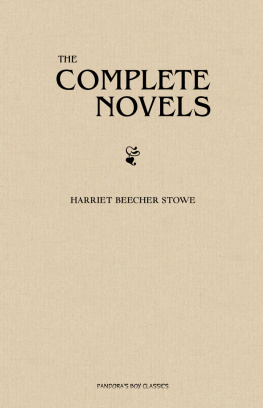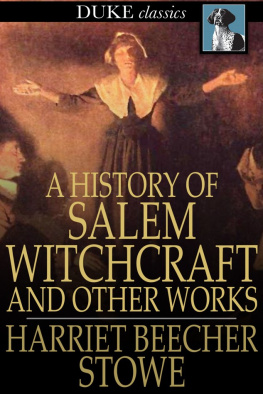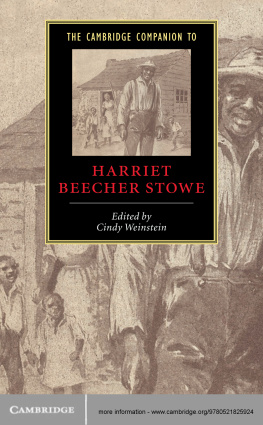1988 The University of North Carolina Press
All rights reserved
Manufactured in the United States of America
Library of Congress Cataloging-in-Publication Data
Boydston, Jeanne.
The limits of sisterhood.
(Gender and American culture)
Includes index.
1. Womens rightsUnited StatesHistory19th centurySources. 2. FeminismUnited StatesHistory19th centurySources. 3. Beecher, Catharine Esther, 18001878. 4. Stowe, Harriet Beecher, 18 111896. 5. Hooker, Isabella Beecher, 18221907.. Kelley, Mary, 1943. II. Margolis, Anne Throne.
III. Title. IV. Series.
HQ1236.5.U6B691988305.42097387-19771
ISBN 0-8078-1768-6
ISBN 0-8078-4207-9 (pbk.)
The paper in this book meets the
guidelines for permanence and durability
of the Committee on Production Guidelines
for Book Longevity of the Council on
Library Resources.
92 915 4 3 2
THIS BOOK WAS DIGITALLY PRINTED.
Acknowledgments
We began this project in 1983 as three individual scholars with different interests in Catharine Beecher, Harriet Beecher Stowe, and Isabella Beecher Hooker. Anne Margolis had been engaged in extensive research on Hooker and the postbellum womens rights movement. Originally projecting an article on the Beecher-Tilton scandal, Margolis became convinced that the three sisters merited a book-length study. Jeanne Boydstons research on the history of housework had led her to recognize the contradictions within Catharine Beechers life and work and to wrestle with the implications of Beechers vision of domesticity for women of other races and classes. In her study of twelve nineteenth-century American women writers, Mary Kelley had come to understand the significance of Harriet Beecher Stowe for illustrating key themes and tensions within the nineteenth-century debate on womans sphere.
In a sense, then, the process of melding these separate interests into a single volume has amounted to an extended conversation among ourselvesa conversation about the nineteenth century and the roles of white middle-class women within it, but also about the implications of that earlier period for the lives of women in the present. We hope the spirit of that conversation has informed the pages that follow.
Research on the sisters roles in the Beecher-Tilton scandal, begun in 1982 with the support of a Grant-in-Aid from the American Council of Learned Societies, was continued under grants from the Division One Research Funding Committee of Williams College. Generous funding for the ongoing work on Catharine Beecher was provided by the Research Council of Rutgers University and a Henry Rutgers Research Fellowship. A Dartmouth College Faculty Fellowship and the Committee on Research made possible more extensive research on Harriet Beecher Stowe. We have all benefited from the assistance of former and present students, including in particular Dina Esposito, Terry Flemming, Marion Halliday, Christine Harrington, Michael Kolster, Katherine Monteiro, and Kathleen Waters. Virginia Close and Patricia Carter, librarians at Dartmouth College, and Peggy Hilbert, secretary at Throne International Metals, lightened many a task. Each of us wishes to thank Gail Patten, the administrative assistant in the Department of History, Dartmouth College, for her commitment to this project.
We were fortunate to be able to draw upon the archival expertise of the following repositories, all of which have preserved and made accessible the extraordinarily rich papers of the Beechers. Particularly indebted as we are to the Stowe-Day Foundation, we thank Joseph Van Why, Elise Thall, Dorothy Mills, and especially Diana Royce and Bill Staples. We also acknowledge the late Joseph K. Hooker for permission to publish his grandmothers papers. We are grateful for the support of the Alderman Library, University of Virginia; the Beinecke Rare Book and Manuscript Library and the Sterling Memorial Library, Yale University; the Connecticut Historical Society; the Connecticut State Library; the Henry E. Huntington Library; the Houghton Library, Harvard University; the Massachusetts Historical Society; the Mount Holyoke College Library/ Archives, Mount Holyoke College; the Arthur and and Elizabeth Schle-singer Library, Radcliffe College; the Sophia Smith Collection, Smith College; and the Vassar College Library, Vassar College.
Iris Tillman Hill, Editor-in-Chief at the University of North Carolina Press, strongly supported the project from the outset. Linda Kerber and Nell Painter, the editors of the series that this volume inaugurates, encouraged our work and offered generous suggestions on the manuscript. We thank David Leverenz and Brenda Silver for reading sections of the materials on Harriet Beecher Stowe, and the members of the Social and Cultural History Seminar at Rutgers-Camden for their comments on an earlier draft of the essays on Catharine Beecher. The late Sydney Ahl-stroms respect for the varieties of religious experience made him an invaluable resource in studying Isabella Beecher Hooker.
The character of this collaboration has also been shaped by the experiences of our individual lives. Sidney Throne provided his daughter with access to the resources of his office. We stand indebted to Ann Bremer for providing a model of sisterhood, to Annette Kolodny for sharing the wisdom of her own experience, and to Lori Ginzberg for caring deeply about the ideas and the words of this manuscript. Manual Ayala, Kirsten Harvey, Todd Harvey, Brooke Karlsen, Jennifer Bernadette Margolis, Natalie Rose Margolis, and Joel Steiker have lived on closer terms with the Beecher family than they might have wishedin the case of Jennifer and Natalie, for virtually their entire lives. We thank them all for their patience.
Language cannot adequately express appreciation for the continuing sensitivity and support of Brian Margolis, Carol Karlsen, and Robert Kelley. Their being here for the duration has meant everything.
May 1987
J. B.
M. K.
A. M.







